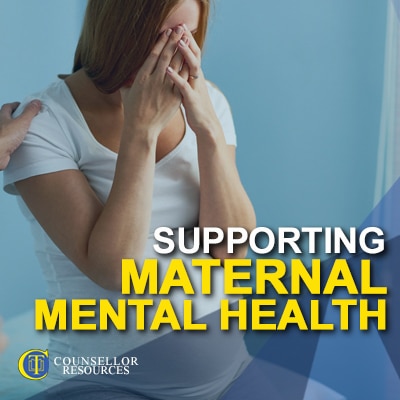In this lecture, you will learn from counsellor and trainer Emma Chapman how and why some women struggle with the transition to motherhood, and how to support maternal mental health in a therapeutic setting.
After attending this online lecture, you will be able to:
- understand what the term ‘maternal mental health’ encompasses
- identify how societal expectations and judgements of motherhood impact on maternal mental health
- recognise the feelings of loss and shame that some women experience during the transition to motherhood
- understand how to support a client who is going through the transition to motherhood.

Emma presents some key facts about maternal mental health, which covers a range of mental health conditions including perinatal depression, perinatal anxiety, perinatal obsessive-compulsive disorder, postpartum psychosis, postpartum post-traumatic stress disorder, birth trauma and adjustment disorder.
Watch this Lecture + Access Hundreds of Hours of CPD
Certified CPD for Qualified Counsellors
- Hundreds of hours of on-demand CPD lectures to help you stay current with your CPD ethical requirements
- Support, and be supported, by thousands of other counsellors as a member of the exclusive online community.
- Access your learning anytime you want ... anywhere you choose ... using any device type — desktop or mobile.

Despite the prevalence of these difficulties, maternal mental health is under-discussed, and you will hear and think about some of the reasons for this situation, looking in particular at societal attitudes on the role of being a mother, drawing on research evidence. Maternal ambivalence – that is, the mixed feelings that every mother experiences towards her child(ren) – often triggers anxiety, shame and guilt, making it very difficult for women to be open and honest about their experiences at the time when they are happening.
Becoming a mother is a huge transition, and can engender feelings of loss of self and own identity. Emma explains how we as therapists can support women in this situation, encouraging:
- re-emergence of self
- self-acceptance
- empowered motherhood.
Supporting women who are mothers to be more empowered also affects their ability to empower their children, so supporting their welfare, development and future lives too.
The lecture ends with a list of 13 references for further reading on this interesting and important topic.
About the Lecture Presenter

Emma Chapman is a counsellor and trainer working in private counselling practice in Cheshire. In her Northwich office, she works with adults, young people and couples.
Emma believes that having good mental health is the key to having a fulfilled and happy life. As a passionate advocate for mental health, Emma also delivers mental health training to a variety of audiences across the North West of England.
Emma is a qualified teacher who came to counselling later on in life after 15 years of working in public sector and charity roles. During this time she worked with vulnerable children, adults and families in teaching, family support, safeguarding and pastoral roles.
After so many years working with children and families who often struggled to manage day to day life, Emma began to observe that poor mental health and trauma played a huge part in keeping people stuck in damaging patterns of behaviour.
This conclusion led her to further training in mental health, and she started her counsellor training in 2014 at Mid-Cheshire College studying part-time. In 2018 she completed an MA in Clinical Counselling at Chester University.
Emma has experience working in an NHS IAPT setting but decided to work privately in order to work with her clients more creatively.
After a short spell teaching counselling at a local college, Emma continued to put her teaching skills to use and further develop some training packages for fellow counsellors, educational settings and businesses.
As a mother of two children, Emma struggled with her own mental health after becoming a Mother. In 2019 she had her research into maternal mental health published in the journal of Crisis, Illness and Loss*. She now specialises in working with mothers experiencing perinatal mental health difficulties in her private practice.
Following some time working at a charity dedicated to the prevention of suicide it became clear to Emma that there was little therapeutic support for those experiencing suicidal ideation.
In her private practice she also works with people who are experiencing Suicidal Thoughts and delivers suicide awareness training to counsellors and other organisations across the North West.
Free Handout Download
Supporting Maternal Mental Health - lecture overview